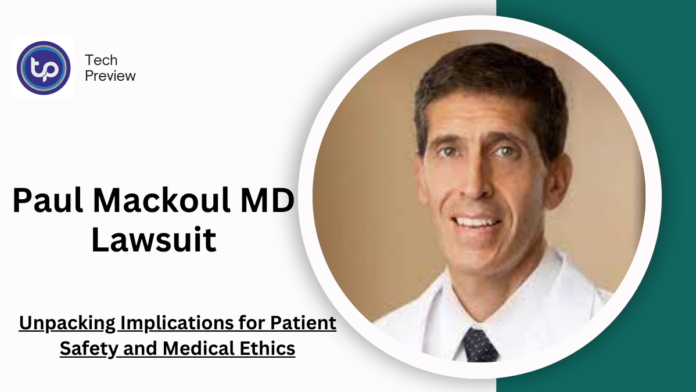The lawsuit against Dr. Paul Mackoul has captured the attention of the medical world, raising serious questions about surgical practices and patient safety.
Allegations of malpractice and misconduct have emerged, prompting a deeper look at how such issues affect both patients and the healthcare community.
In this article, we’ll explore the details of the case, the surrounding allegations, and what this means for the future of medical practice.
The Allegations Unpacked
The core of the lawsuit revolves around claims of malpractice against Dr. Mackoul, a well-known figure in gynecologic surgery. Patients have raised alarms over various issues, from surgical mistakes to troubling interactions with staff.
A pivotal moment came after the death of a uterine cancer patient in 2015, which linked her complications to a procedure performed by Dr Mackoul without the proper certifications.
The lawsuit didn’t appear out of nowhere; it stemmed from multiple complaints by former patients and medical professionals.
Reports detailing adverse surgical outcomes prompted investigations, illuminating Dr. Mackoul’s practices and raising ethical concerns within the medical field.
ALSO READ: Sierra Mist Lawsuit: The Reason Why PepsiCo Replaced It with Starry
A Heartbreaking Case
One of the most alarming allegations involves a patient who tragically passed away following a surgery conducted by Dr Mackoul.
This patient, who was diagnosed with uterine cancer, underwent a procedure in which a catheter was improperly inserted into her chest. The lack of appropriate certification for such a procedure has led to serious questions about Dr. Mackoul’s qualifications and practices.
Implications for Patient Safety
These allegations serve as a crucial reminder of the risks associated with surgical procedures. They highlight the need for patients to feel assured that their healthcare providers are adequately trained and competent.
Patient safety must always come first, and this case stresses the importance of informed decision-making before any medical procedure.
The repercussions of the lawsuit also extend to the training of future medical professionals. Aspiring gynecologic surgeons must understand the ethical responsibilities they hold.
Medical schools and training programs need to prioritize teaching integrity and professionalism to ensure that future practitioners uphold high standards of care.
Investigating the Claims
The legal proceedings surrounding the lawsuit are ongoing, with thorough investigations into the circumstances leading to the patient’s death.
Legal experts are analyzing whether Dr. Mackoul adhered to established medical standards. These inquiries are essential for holding medical professionals accountable and ensuring justice for affected patients.
Discussions in the Medical Community
The Paul Mackoul MD lawsuit has ignited conversations among healthcare professionals about ethics and standards of care.
Many are calling for stricter regulations to prevent such incidents in the future, while others emphasize the importance of maintaining physicians’ autonomy in clinical judgment.
Dr. Mackoul is known for his work in minimally invasive surgery, which offers benefits like faster recovery and less tissue damage.
However, these allegations reveal the complexities and risks involved in such specialized procedures. Success in minimally invasive surgery relies on precision and skill, highlighting the need for rigorous training.
Rebuilding Confidence
This lawsuit has undoubtedly impacted how the public perceives healthcare providers. Patients may hesitate to seek treatment, fearing potential negligence or harm.
To rebuild trust, healthcare institutions must focus on transparency and accountability, ensuring open lines of communication with patients.
Before the lawsuit, Dr. Mackoul had a commendable reputation in gynecologic surgery, and he was known for his innovative techniques.
However, the allegations have tarnished his legacy, prompting reflection on the responsibilities that come with professional recognition.
Looking Ahead: The Future of Gynecologic Surgery
As the Paul Mackoul MD lawsuit unfolds, it highlights the need for continuous improvement in surgical practices.
The focus must remain on patient-centred care and a culture of accountability in the medical field.
Future advancements in gynecologic surgery should prioritize safety and ethical practices to ensure that patients receive the highest quality of care.
Conclusion
The Paul Mackoul MD lawsuit serves as a crucial reminder of the importance of ethics, safety, and accountability in healthcare.
As investigations continue, it’s essential for the medical community to reflect on these lessons and strive for improvement.
Building a healthcare system grounded in trust and competence will ultimately benefit both patients and practitioners alike.
People May Ask
What allegations are being made against Dr. Paul Mackoul?
Dr. Mackoul faces allegations of malpractice, including surgical errors and improper patient interactions, particularly following the death of a uterine cancer patient.
How has this lawsuit affected public trust in healthcare?
The lawsuit has led to increased concern among patients about the safety of treatments and procedures, resulting in hesitance to seek care from certain providers.
What is happening with the legal proceedings?
Ongoing investigations are examining the circumstances surrounding the patient’s death, focusing on whether Dr. Mackoul followed appropriate medical standards.
How will this impact future medical training?
The case highlights the need for ethical training in medical education, preparing future healthcare providers to uphold high standards of care and professionalism.
What does the future hold for gynecologic surgery?
The lawsuit underscores the importance of innovation and rigorous training in surgical practices, aiming for a culture of accountability and patient-centred care in the medical profession.
Click here to learn more.









